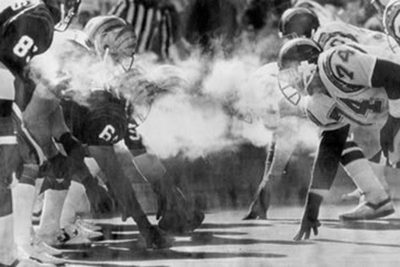The 2020 NFL season, in all it’s Covid-19 weirdness, is finally here beginning this week. Rayonsports is back with our weekly Throwback Thursday feature. To start the year, we’re looking at a week one matchup between the Los Angeles Chargers and Cincinnati Bengals. For the opening TBT post of the season, we’ll travel back to January 10, 1982 for the AFC Championship game of the 1981 season played between these 2 teams. The contest went down in NFL lore as the “Freezer Bowl”. Played at Cincinnati’s Riverfront Stadium, is was the coldest game in NFL history as the temperature was -9 degrees Fahrenheit which, combined with the day’s wind chill factor, made it feel like -37 degrees. For the Chargers, based in San Diego, it was a rude awakening. Besides making their home in sunny southern California, they were coming off of a grueling overtime duel in Miami that was played in polar opposite conditions – 88 degrees with high humidity. The weather affected the coin toss as the Bengals won the opening toss and elected to take the wind at their backs instead of the ball. So when San Diego took the ball to start the second half, the Bengals wound up kicking off to start both halves.
Bengal coach Forrest Gregg used the unusual strategy figuring the howling winds would affect the Chargers’ high-powered passing attack, and it worked as Cincinnati jumped out to a 10-0 lead on a Jim Breech field goal and an 8 yard scoring pass from Ken Anderson to M.L. Harris. San Diego put together a drive against the wind that stalled, and their first attempt to get on the board was thwarted when kicker Rolf Benirschke missed a 37 yard field goal attempt into the harsh wind. The Chargers got on the board in the second quarter, with the wind at their backs, as Dan Fouts found his All Pro tight end, Kellen Winslow, for a 33 yard touchdown. But that’s all they could muster, and the Bengals drove downfield against the wind, thanks to a long kickoff return from David Verser, to beat the wind and add a score on a one yard plunge by fullback Pete Johnson, upping their lead to 17-7. Johnson was the unsung hero for the Bengal offense on the day as he ground out 80 hard-earned yards. The Chargers were stymied the rest of the way by the weather and a tough Bengal defense. They drove into Cinci territory 5 more times but came up empty on the scoreboard. Meanwhile, the Bengals added another Breech field goal, and when Anderson found Don Bass on a 3 yard TD pass to put his team up 27-7, the game was all but over. That wound up being the final score as the Bengals advanced to their first Super Bowl, where they would become the victims of Joe Montana’s magic in a 26-21 loss.
Ironically, Cincinnati’s coach Gregg had also been part of the other iconic cold weather game in NFL history as a guard for Green Bay in the 1967 “Ice Bowl”. For the Chargers, it was an especially long and sad trip home from the loss, as their return flight to San Diego was delayed for over 3 hours due to ice buildup on the plane.

Bengals, Chargers battle in the Freezer Bowl